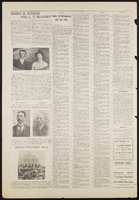Search the Special Collections and Archives Portal
Search Results
Delores Brownhofer Neonis Photograph Collection
Identifier
Abstract
The Dolores Brownhofer Neonis Photograph Collection (approximately 1940-1970) contains photographic prints, negatives, and a slide depicting the Brownhofer family at restaurants, bars, and casinos in Las Vegas, Nevada.
Archival Collection
Young Audiences New York, Nevada Humanities Photograph Collection
Identifier
Abstract
The Young Audiences New York, Nevada Humanities Photograph Collection (approximately 1970-1979) contains black-and-white photographic prints, slides, and negatives of the Las Vegas, Nevada chapter of the Young Audiences New York arts organization. Images include scenes of concerts, workshops, and chapter outings at public parks. There are images of specific bands within the chapter such as the Brass Quintet, Vocal Quartet, and Woodwind Quintet. Lastly, there are images of celebratory banquets honoring members of the Las Vegas chapter.
Archival Collection
Breck Wall Photograph Collection
Identifier
Abstract
The Breck Wall Photograph Collection, approximately 1960 to 1980, consists of black-and-white photographic prints depicting comedian and entertainer, Breck Wall, and other cast members of the comedy revue, “Bottom’s Up!” in Las Vegas, Nevada. Images include scenes from sketches performed on the show, group shots of the cast members off-set, and portraits of Wall.
Archival Collection
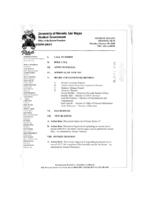
Meeting minutes for Consolidated Student Senate, University of Nevada, Las Vegas, October 30, 2000
Date
Archival Collection
Description
Text
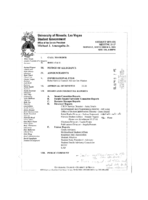
Meeting minutes for Consolidated Student Senate, University of Nevada, Las Vegas, September 08, 2003
Date
Archival Collection
Description
Text
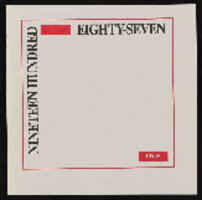
University of Nevada, Las Vegas (UNLV) 24th commencement program
Date
Archival Collection
Description
Commencement program from University of Nevada, Las Vegas Commencement Programs and Graduation Lists (UA-00115).
Text
Walking Box Ranch Photograph Collection
Identifier
Abstract
The Walking Box Ranch Collection (1880-1979, bulk 1930-1945) contains digital images compiled by the University of Nevada, Las Vegas (UNLV) Public Lands Institute. The collection consists of images of the Walking Box Ranch (Searchlight, Nevada), the Mojave Desert, and the Bell Family, consisting of American film stars Rex Bell, Clara Bow, and their children. There are also candid and professional photographs of Rex Bell and Clara Bow taken at various locations, some of which include friends and other family members, as well as a large number of unidentified film stills from Rex Bell movies. Images in this collection are from Bell family photograph albums and assorted prints, and were reformatted into digital images by the UNLV Public Lands Institute.
Archival Collection
Ronzone Family Papers
Identifier
Abstract
Ronzone Family Papers (1900-1991) include newspaper clippings, business documents, correspondence, certificates, yearbooks, publications, artifacts, and photographs. The papers document their lives in Nevada, their department store, and Dick Ronzone's involvement in local politics.
Archival Collection
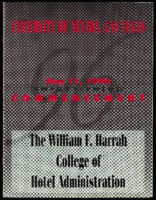
University of Nevada, Las Vegas (UNLV) William F. Harrah College of Hotel Administration 33rd commencement program
Date
Archival Collection
Description
Commencement program from University of Nevada, Las Vegas Commencement Programs and Graduation Lists (UA-00115).
Text

